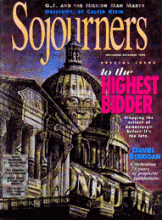Pete MacDowell is the director of the Democratic Reform Project, a program of the Institute for Southern Studies in Chapel Hill, North Carolina. He is also a coordinator of the North Carolina Alliance for Democracy. Bob Hulteen interviewed him by telephone in mid-September.
-The Editors
Sojourners: Many people from varying political perspectives are talking about how the political system is not working. What do people mean when they say this?
Pete MacDowell: A couple of years ago, we began a series of focus groups. We started with the usual focus group question, "Is North Carolina on the right track or the wrong track?" Most of the people said it was on the wrong track, and they were particularly worried about three areas-youth and education; jobs and income, especially low-wage jobs in North Carolina; and the environment.
In the African-American groups, the collapse of health care and social services was another big concern.
Then we asked, "How did this come about? This is a democracy, so you can make the state and national governments respond to the public will." And the response was, "Yeah, right."
We then heard the anger directed toward politicians and the political process. The people have a visceral hatred of political ads. They are disgusted with blow-dried politicians that read the polls and say, "I am with you." They are very aware that they are not factors, and that vested interests and the elite are. It takes a couple of steps for people to focus beyond their gut dislike of politicians and of politics as it is now, to an analysis of what has gone wrong and who is in control if they are not.
The United States has really become an atomized pseudo-democracy. As we say, If there is not community, there cannot be democracy; if there is not democracy, there cannot be justice.
The Democratic Reform Project is trying, in an experimental way, to do community-building organizing.
Read the Full Article

